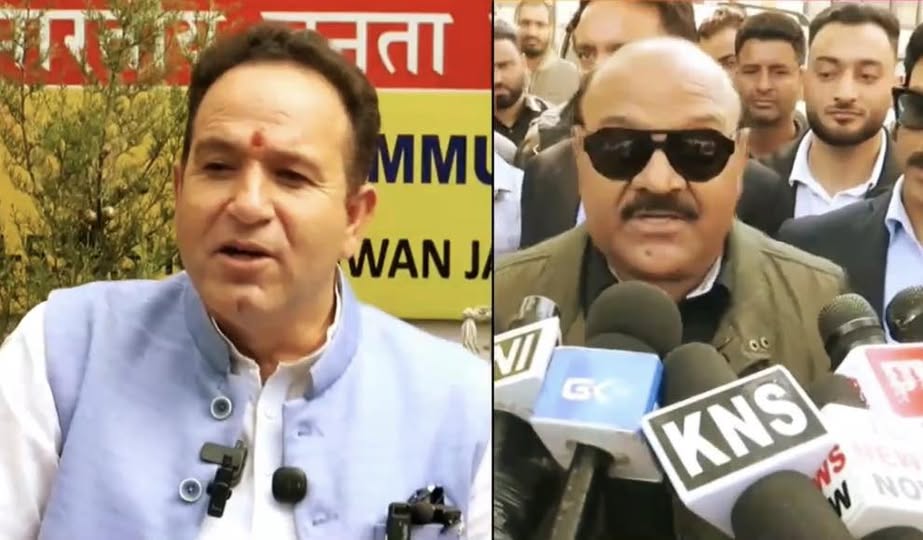A public spat that matters beyond rhetoric
By: Javid Amin | 09 October 2025
When a Deputy Chief Minister publicly asks an opposition leader to “tell us what you did in 11 years,” it is more than a soundbite — it is a provocation that forces a polity to account for past records, ongoing delivery, and political responsibility. The recent exchange between Deputy Chief Minister Surinder Choudhary and Leader of Opposition Sunil Sharma has widened into a debate about governance, implementation, and political narrative. Each side claims the moral high ground: the LoP accuses the NC government of failing to deliver on flagship promises; the Deputy CM counters that many problems predate the current administration and that the party is busy correcting long-pending gaps. Both claims have implications for governance, public trust, and upcoming elections.
The public exchange — succinct timeline and quotes
On a recent media interaction, Leader of Opposition Sunil Sharma publicly criticized the government for focusing on slogans and statehood while failing to deliver on welfare promises and administrative appointments. Sharma underlined that the government had held 16 cabinet meetings and that 97 files had been approved by the Lieutenant Governor (LG), framing this as proof that administrative bottlenecks were not the real reason for inaction.
Deputy Chief Minister Surinder Choudhary responded sharply, asking Sharma and his party to account for the previous 11 years — the period during which the BJP either shared power locally or occupied the political space by way of coalition or administrative influence. Choudhary argued that the present government was addressing projects and files that had been pending for long stretches — including the “business rules” file he said was already cleared by cabinet and awaiting LG approval.
Both exchanges were aired widely in local and national media, and both actors have since doubled down on their narratives — one claiming obstruction and the other demanding delivery.
The 2024 promises in brief — what people were promised, and why they matter
In the 2024 election, the National Conference’s platform promised a set of flagship welfare and governance measures aimed at restoring dignity and delivering basic services. Among the most politically resonant were:
-
200 units of free electricity per household for targeted beneficiaries, introduced as a commitment to ease winter hardships. (Budget proposals and CM statements have reiterated this pledge.)
-
Expanded subsidized ration (10 kg per eligible family under certain categories), aimed at bolstering food security.
-
Large-scale employment targets, including promises of significant new government hiring and special youth employment packages.
-
Health and welfare measures, such as expanded coverage and targeted stipends for vulnerable groups.
These promises matter because they target immediate material needs — energy, food, health and jobs — and because they set citizens’ expectations in a fragile economy. Failure to launch these schemes quickly feeds political disillusionment; conversely, even partial, fast rollout can create goodwill.
Paper vs practice: unpacking “16 cabinet meetings” and “97 files”
Sunil Sharma’s repeated citation that the government held 16 cabinet meetings and that 97 decisions were approved by the Lieutenant Governor is a key political charge. What does it mean in practice?
-
Cabinet meetings are where elected ministers approve policy proposals, project sanctions and administrative changes. Holding them signals political engagement. Sharma’s point: having convened meetings, the NC government cannot claim administrative blockage for lack of implementation.
-
LG-approved files: In the Union Territory arrangement, certain policy files require concurrence or final signing by the Lieutenant Governor. Sharma’s assertion that 97 files were approved is intended to convey that the executive has been active and that the administration cannot blame the bureaucracy or the LG for non-delivery.
But there are complications:
-
Not all “approved files” are delivery-ready. Some approvals are for in-principle policy decisions; implementation may still require tendering, recruitment rules, fund releases from central schemes, or municipal coordination.
-
Approved files can also be partial approvals — e.g., sanctioning a project subject to compliance checks, environmental clearances, or tender processes that take months.
-
The identity of the files matters. If many of the 97 are procedural or related to bureaucracy reshuffles, their approval does not automatically translate into the rollout of the flagship welfare measures citizens expect.
Bottom line: The numbers are politically useful but technically ambiguous. They are a starting point for audit, not an endpoint. Independent reporting confirms the numbers were cited by the LoP; independent scrutiny shows that many of the big-ticket promises cited by critics — like universal 200-unit free electricity rollout, widespread hiring or mass welfare disbursement — have not yet been seen on the ground.
Deputy CM’s defense — correcting “11 years” and the business rules claim
Deputy CM Surinder Choudhary’s central defense is twofold:
-
That many projects and policy issues the government is now addressing were left pending for a long time — across the previous coalition years and the LG-run period; and
-
That the NC government is actively restoring and reprocessing many of those pending matters, and should not be judged for inherited administrative backlog.
Choudhary specifically named the business rules file — a major procedural document that can set the frame for how services are delivered, appointments proceed, and administrative powers are exercised. He said the cabinet had passed the business rules and urged the LG to clear it.
Cross-check & context: news reports confirm both Choudhary’s emphasis on inherited backlogs and his call for LG approvals. They also confirm that the LoP openly accused the government of claiming files were stuck when the LoP says the LG had already cleared many decisions — hence a politically charged tug-of-war over who controls what.
Interpretation: The Deputy CM’s defense is partly administrative (we are clearing old files) and partly rhetorical (answer their 11-year record). Both are valid lines politically — but the governance test remains tangible: are citizens seeing better services now?
Deliverables on the ground — what citizens see (education, health, power, jobs, welfare)
To evaluate competing claims, we must look at the ground.
Power & winter preparedness
-
Promise: 200 units of free electricity to targeted families was a headline promise. Budget statements and the CM’s speeches reiterated this commitment.
-
Ground reality: Independent local reporting and resident testimonies suggest recurrent winter curtailments in rural and peri-urban areas. The full, universal rollout of free 200-unit coverage remains incomplete for large segments, and formal notifications are still awaited for universal implementation. Social media and local outlets show households still coping with extended cuts and generator dependency.
Ration & basic food security
-
Promise: expanding ration (10kg to eligible families) was budgeted in proposals.
-
Ground reality: Implementation of expanded in-kind ration schemes requires beneficiary lists, supply chain adjustments and distribution logistics. Reports show that while some targeted beneficiaries have seen relief, a comprehensive universal implementation is pending.
Employment & youth jobs
-
Promise: large-scale job creation, youth employment packages and specific targets drew voter attention.
-
Ground reality: Hiring remains constrained. While there have been targeted recruitments and job fairs, independent data suggests no immediate large-scale absorption of unemployed youth. The LoP’s pressure over vacant posts and appointments feeds into popular frustration.
Education & health human resources
-
Promise / expectation: filling teacher and medical officer vacancies quickly to improve service delivery.
-
Ground reality: Multiple field reports show schools and health centres still report shortages. Filling such posts is both a political priority and an administrative challenge (requires recruitment rules, budgets, and approvals). Until business rules and appointment protocols are streamlined and positions advertised, the human-resource gap persists.
Synthesis: The NC government has announced budgetary intentions and some in-principle approvals, but on-the-ground delivery for major social-welfare items remains partial. This partially validates both sides: there is action on paper; but citizens rightly expect tangible benefits now.
Administrative mechanics: files, the LG’s role, and “business rules”
Understanding the interplay between cabinet approvals and LG sign-off is crucial.
-
Union Territory governance: In a UT arrangement, the LG plays a strong constitutional role. Files that require executive concurrence are sent to the LG. If the LG has questions or administrative objections, a file can be returned for clarification or rework. This is normal in federal administrative practice.
-
The “business rules” file: This is a procedural document that sets how appointments, recruitment, contract awards, and administrative delegations will happen. If cleared, it can accelerate many subordinate processes. The Deputy CM said the cabinet approved it and that it awaits LG sign-off; the LoP countered that many files had already been approved by the LG.
Why it matters: If the business rules are not cleared promptly, recruitments, regularisations and tendering remain slow. If the LG has indeed signed off on many files while some critical files remain with the LG, that shows both progress and selective blockage — a mixed administrative picture.
Verification: Multiple local outlets reported both claims: the LoP’s 16 cabinet meetings/97 files narrative and the Deputy CM’s demand that LG clear business rules. These are not mutually exclusive — there can be 97 approved files and still have critical implementation-stalling files pending. The audit exercise needed now is granular: itemize the 97 files and identify which are implementation-critical.
Political optics and strategy — why BJP is pressing, why NC pushes back
Why the BJP pushes the narrative
-
Electoral test: With bypolls (Nagrota and Budgam) upcoming, the BJP has incentives to exploit governance gaps and show that the NC has under-delivered; this sharpens the opposition’s campaign.
-
Narrative control: Emphasizing “approved files” and cabinet meetings shapes the discourse: governance is not about slogans; it’s about execution. This is a simple, electorally resonant claim.
Why NC pushes back
-
Inheriting backlog: The NC contends many projects were left mid-stream by the previous coalition or LG rule, and the present stint focuses on clearing them. This counters the simplistic “no delivery” narrative.
-
Political framing: By reframing the debate as “answer for 11 years”, NC turns the spotlight on opposition accountability and on the multiple administrations that preceded it.
Tactical consequences: Both parties are aiming at public perception: the BJP to show NC’s failure; NC to show it is cleaning up a messy inheritance. Voters decide which narrative rings truer in daily life — access to power, health, food, and jobs.
Electoral context: Nagrota & Budgam bypolls — immediate stakes
The bypolls to the Nagrota and Budgam assembly seats are not routine: they are politically symbolic barometers.
-
Nagrota: traditionally a stronghold for the BJP; retaining it tests organizational strength in that region.
-
Budgam: a contested seat in central areas; contesting Budgam offers opposition parties (including BJP) a chance to measure penetration into areas where they have historically been weak.
The bypolls also force both parties to articulate delivery narratives: the BJP can claim the NC failed to deliver on its promises; the NC can argue it is clearing inherited backlogs and needs time. Both arguments will be run on ground messaging, candidate selection, and local issues such as compensation for floods, compensation for agricultural losses, and local public works — issues the Deputy CM raised in challenging the LoP’s record.
Why this matters for the national picture: Small contests shape perceptions of momentum ahead of the 2026 general elections. Parties use bypoll results to recalibrate strategy and candidate selection models. The BJP’s panel-preparation and the NC’s defense are both in this strategic frame.
Civil society and public sentiment — what ordinary people say
Beyond the formal statements, residents’ voices tell a consequential story:
-
Business owners and shopkeepers often cite recurrent power cuts and disrupted commerce as immediate grievances.
-
Teachers and frontline health workers point to chronic unfilled posts and the adverse consequences on service delivery.
-
Youth and job-seekers voice frustration over slow hiring and symbolic job fairs that do not translate into placements.
-
Families affected by disasters (floods in prior years) demand timely compensation and rehabilitation — a point the Deputy CM used to question the LoP’s record.
Social media and local editorial pages reflect impatience but also political polarisation: some call for urgent administrative action, while others see the exchange as political blame-shifting.
Analyst take: Public mood is transactional: voters reward quick, visible improvements in utilities and services. Campaign promises lose credibility unless demonstrable benefits reach households quickly.
Practical policy prescriptions — what should be done now (evidence-based)
If the NC government — or any administration — wants to translate political promises into durable public trust, the following are pragmatic steps, prioritized and feasible within the administrative framework:
1. Publish a detailed implementation scoreboard
-
Itemize the 97 files referenced by opponents and identify which are implementation-critical, which are policy approvals, and which are procedural. Transparency reduces political noise.
2. Fast-track the Business Rules file (if truly pending)
-
If the business rules file governs appointments and delegations, a clear timeline for LG review and signing should be requested and published. If LG has concerns, the exact legal or procedural basis should be shared publicly to avoid political misinterpretation.
3. Announce time-bound pilots for flagship schemes
-
Instead of a blanket promise, launch clear pilots for the 200-unit electricity scheme in one or two districts with fast, verifiable delivery; simultaneously, publish beneficiary lists and distribution mechanisms.
4. Emergency hires & contractual regularisation
-
Use the business rules and budgetary headroom to regularise critical daily-wager roles in education and health on a fast-track (6–12 months), with transparent selection norms. This addresses both service delivery and employs local youth.
5. Disaster compensation audit
-
Publish compensation data for prior floods and outstanding claims, and set a 90-day window to process high-priority claims. This addresses a politically sensitive grievance the Deputy CM rightly raised.
6. Public audit of LG approvals vs pending files
-
Ask the LG’s office to publish a public registry (redacted for security where needed) of files with dates and current status. This reduces the “who is blocking whom” narrative and focuses on solutions.
7. Data-driven communication
-
Replace general rhetoric with monthly dashboards on energy supply hours, teacher vacancies filled, hospital posts advertised, and number of jobs created — all verifiable by third-party monitoring.
Why these steps help: They create a measurable track record, reduce political ambiguity, and empower citizens — which helps restore trust faster than slogans.
Conclusion — accountability, timelines and political reality
The Surinder Choudhary–Sunil Sharma exchange is not just political banter; it surfaces a core governance issue: how administrations translate mandates into measurable outcomes. The LoP is right to press for accountability when promises remain unfulfilled; the Deputy CM is right to highlight that many problems were inherited and require administrative clearing.
But both positions must submit to the court of results. Citizens do not want an argument about who inherited more problems; they need warmth in winter, steady electricity, adequate food security, functioning schools and hospitals, and reliable employment pathways.
The real test is simple and immediate: within the next six months, can the administration convert at least a handful of headline promises into visible, sustainable services (e.g., a transparent pilot of the 200-unit power scheme, a fast-track hiring of teachers and health staff in critical vacancies, and a published audit of the business rules and the 97 files)? If yes, rhetoric will matter less. If no, political consequences in bypolls and beyond will follow.
The public’s verdict is pragmatic: governance first, explanations second.



